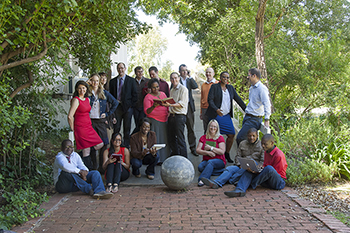Latest News Archive
Please select Category, Year, and then Month to display items
23 November 2022
|
Story André Damons
![]()
Prof Motlalepula Matsabisa, Professor and Director of Pharmacology, will play host to the various stakeholders to network and share knowledge on current developments in indigenous knowledge research and product development, biodiversity, innovation, and commercialisation of the IK-based research products. The Indigenous Knowledge System (IKS) for Health unit in the Department of Pharmacology within the UFS Faculty of Health Sciences was last year awarded an annual Technology Innovation Agency Platform (TIA) grant of R17 million for the next five years.
The research and teaching programme in the School of Clinical Medicine has since been rebranded and is now known as the African Medicines Innovation and Technology Development Platform (AMITD), which will strive to respond to community health needs and address industry research needs and challenges.
The indaba will showcase progress made by TIA and other entities in enriching the development and commercialisation of IK-based innovations. It will take place from 24 to 25 November 2022 in the Equitas Senate Hall at the UFS.
Prof Matsabisa is the chairperson of the World Health Organisation’s (WHO) Regional Expert Advisory Committee on Traditional Medicines for COVID-19. He is also a visiting professor at the Beijing University of Chinese Medicine (BUCM) in Beijing, China, and the Deputy President of the South African Society for Basic and Clinical Pharmacology.

Prestige Scholars Programme invests in promising academics
2015-06-24

Photo: Sonia Small |
Whilst many academics find it challenging to have sustainable funding for specific projects, it is often just as challenging to find relevant exposure and good mentorship programmes to fully prepare academics toward becoming full professors.
Prof Jonathan Jansen, Vice-Chancellor and Rector of the UFS, designed the Vice-Chancellor’s Prestige Scholars Programme (PSP) specifically targeting newly-completed post-doctoral students who are already members of the academic staff.
The goal is to select the most promising young scholars and to make substantial institutional investment in their development.
To date, the PSP has produced 2 Fulbright scholars; 10 National Research Foundation (NRF) rated scholars; 1 NRF Blue Skies research project and 14 NRF Thuthuka-funded projects. These scholars work with the best academics at leading universities on three continents.
Prof Jackie du Toit, co-director of the programme, explains that while the PSP does not provide funding, it is a great programme to empower scholars by means of assistance towards generating funding from outside sources.
Prof Du Toit co-directs this programme with Proff Corli Witthuhn, Vice-Rector: Research and Niel Roos from the Department of Africa Studies.
“The PSP bases its approach to funding on the philosophy that young scholars are to be encouraged towards financial independence, based on a viable postdoctoral project that would sustain their scholarship for five to eight years post PhD. We believe that the cachet and long-term sustainability of existing funding programmes such as Fulbright outweighs the short-term benefits of automatic funding from the PSP. We also endeavour to teach young scholars to work cleverly within institutional parameters, rather than leave them floundering once they step off the active PSP.”